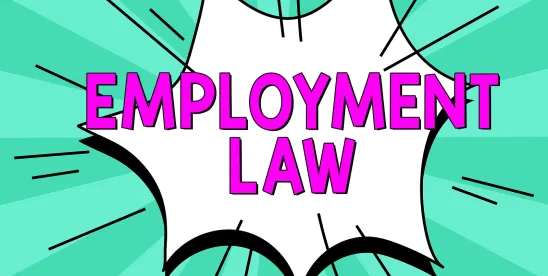As employers anticipate possible changes in labor policy stemming from the recent presidential election, they should also consider two recent National Labor Relations Board (Board) decisions and a General Counsel (GC) Memorandum that have, at least for now, significantly changed how employers address labor issues. The two Board decisions issued in November 2024 overruled decades-old precedent concerning the legality of mandatory captive audience meetings and how employers present predictions concerning the impact of unionization on the employee and employer relationship. The GC memorandum urges the Board to find certain non-compete and stay-or-pay provisions unlawful. Employers should be aware of these three updates, detailed below, as they evaluate their labor policies, especially because the new administration may be friendlier to labor than prior Republican administrations.
Mandatory “Captive-Audience Meetings” Are Now Unlawful
On November 13, 2024, the Board overturned Babcock & Wilcox Co., 77 NLRB 577 (1948), a 76-year-old precedent allowing employers to hold “captive-audience meetings”—a common feature of employer campaigns. The new decision, Amazon.com Servs. LLC & Dana Joann Miller & Amazon Lab. Union, 373 NLRB No. 136 (Nov. 13, 2024), limits how employers can now campaign during unionization efforts.
Previously, employers could compel employees to attend meetings to listen to their view on whether employees should unionize—referred to as “captive-audience meetings”—up until 24 hours before the representation election. Now, employers can no longer compel attendance at meetings where the employer expresses opinions, whether in support or opposition to unionization. The Board reasoned that an employer interferes with an employee’s decision to exercise their Section 7 rights by compelling attendance at a captive-audience meeting “on pain of discipline or discharge.” Namely, the Board held that captive-audience meetings violate Section 8(a)(1) because they have a reasonable tendency to interfere with and coerce employees in exercising their Section 7 right to freely decide whether to unionize, including the right to determine whether, when, and how they will listen to and consider the employer’s view.
While employers can express their views on unionization under the First Amendment and Section 8(c) of the National Labor Relations Act (Act), the Board emphasizes limitations on the circumstances surrounding an employer’s dissemination and expression of speech. Section 8(c) of the Act permits an employer to hold and express its views as to unionization, but that protection only applies if no “threat or reprisal or force or promise of a benefit” is made. In short, Section 8(c) does not license employers to compel employees on pain of discipline or discharge to attend meetings where they are forced to listen to the employer’s views, as such amounts to a “threat of reprisal” and is coercive in effect. That speech is not protected under the First Amendment because, according to the Board, no one has the right to force ideas upon an unwilling recipient.
An employer “compels” attendance if, under all circumstances, employees could reasonably conclude that attendance is required as part of their job duties or could reasonably conclude that failure to attend or remain could subject them to discharge, discipline, or other adverse consequences. The decision does not prohibit employers from holding workplace meetings with employees to express lawful views on unionization in a noncoercive manner. Employers can take advantage of the decision’s safe harbor, which provides that an employer can avoid liability if it informs employees reasonably in advance of a meeting that:
- The employer intends to express its views on unionization at a meeting at which attendance is voluntary;
- Employees will not be subject to discipline, discharge, or other adverse consequences for failing to attend the meeting or for leaving the meeting; and
- The employer will not keep records of which employees attend, fail to attend, or leave the meeting.
Failure to provide these assurances does not result in a violation, but this framework provides guidance for employers seeking to express views in a noncoercive manner. However, the assurances will not immunize coercive conduct or statements made during a meeting.
On this issue, following the Board’s policy shifts are not enough, as many states have passed legislation prohibiting captive-audience meetings. Several courts are currently considering the legitimacy of those state-law prohibitions.
A Statement Suggesting Employees Cannot Directly Present Grievances to their Employer Following Unionization Could be Deemed a Coercive or Threatening Statement
In Siren Retail Corp. d/b/a Starbucks & Workers United Affiliated with Serv. Emps. Int'l Union, 373 NLRB No. 135 (Nov. 8, 2024), the Board overruled Tri-Cast, Inc., 274 NLRB 377 (1985), a nearly 40-year-old decision, and changed the test for determining whether employer predictions concerning the impact of unionization on the employee and employer relationship amount to unlawful threats. Under Tri-Cast, the Board historically found categorically lawful employer statements that unionization would eliminate employees’ ability to address workplace issues individually with their employer. Starbucks now restricts how an employer can relay to employees that, once unionized, the employer will no longer be able to directly deal with employees—a topic often highlighted during unionization. The Board found a case-by-case approach appropriate given the Supreme Court precedent set forth in NLRB v. Gissel Packing Co., 395 U.S. 575 (1969). Now, under Starbucks, for a prediction to be lawful, employer predictions about the negative impacts of unionization on employees’ ability to address issues individually with their employer “must be carefully phrased on the basis of objective fact to convey an employer’s belief as to demonstrably probable consequences beyond [its] control.”
Generally, once a majority of unit employees choose a union, that union serves as the employees’ exclusive representative for collective bargaining. An employer, therefore, typically cannot bypass the union and deal directly with represented employees. However, Section 9(a) of the Act also provides:
[A]ny individual employee or a group of employees shall have the right at any time to present grievances to their employer and to have such grievances adjusted, without the intervention of the bargaining representative, as long as the adjustment is not inconsistent with the terms of a collective-bargaining contract or agreement then in effect: Provided further, That the bargaining representative has been given opportunity to be present at such adjustment.
The Board indicates this language suggests that, even when employees are represented, the Act provides circumstances where the employee can directly present grievances to their employer so long as it is not inconsistent with the collective bargaining agreement. The Board found a general statement that an employer will no longer be able to handle personal requests may amount to an unlawful threat to eliminate an existing beneficial practice, given the exception above that such direct dealing can be permitted if it is not contrary to the collective bargaining agreement. Therefore, employer statements that broadly predict unionization will foreclose employees’ ability to address issues individually with their employer are not reasonable predictions about the actual legal consequences of unionization. As a result, an employer’s statement, based on its content and context, that an existing practice of permitting individual employees to address issues directly with the employer must end upon unionization amounts to an unlawful threat of retaliation that an employer, on their own initiative, may end that existing practice.
Instead, employers must ensure all statements concerning the effects of unionization are accurate, based on objective fact, and consistent with the actual language of the Act, rather than a broad generalization. For instance, the Board emphasizes that a statement indicating to employees that “when they select a union to represent them, the relationship that existed between the employees and the employer will not be as before” is not a threat because it is an objectively true statement. The Board notes that employers can avoid coercive speech by eliminating conscious overstatements that will mislead employees. The Board concludes that a statement, for example, that the Act requires the employer to eliminate any practice of individual grievance resolution if employees choose union representation is not based on objective fact, given the language of the law.
GC Urges NLRB to Find Certain Non-Compete and Stay-or-Pay Provisions Unlawful
In a memorandum issued on October 7, 2024, GC Jennifer Abruzzo urged the Board to find certain non-compete provisions unlawful and states that certain “stay-or-pay provisions” may infringe upon employees’ rights to engage in protected concerted activity under Section 7 of the Act. GC Abruzzo finds such provisions could chill employees’ rights to take collective action to improve their working conditions under Section 7 and may result in a Section (8)(a)(1) unfair labor practice violation. Employers should take notice of this memorandum, given GC Abruzzo’s suggestion of “make-whole relief” for employees disciplined or subject to enforcement actions based on overly broad provisions in employment or non-compete agreements. And, while not the official stance of the Board or binding law, the memorandum provides policy guidance and insight into the GC’s enforcement initiatives. Please see our previous update for a more detailed summary of GC Abruzzo’s memorandum.
Conclusion
Employers must remain diligent in staying abreast of these recent shifts in labor law and policy, especially on the cusp of an administration change. While GC Abruzzo’s term appears likely to end early in 2025, and the Board majority could flip in 2025 or 2026, the new Republican administration’s position on labor policy remains unclear, especially in light of the recent nomination of a pro-labor nominee to lead the Department of Labor. What’s clear is that change is afoot now and in the years to come—making it crucial for employers to consult with competent legal counsel regarding their approach to labor-related concerns.




 />i
/>i

